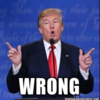- Dec 27, 2017
- 24,364
- 53,736
- AFL Club
- North Melbourne
Depends on your version of worse. My version of worse would be finding form now the season is dead and finish 9-10th.
Leaving LDU, Ahern in the 2’s and both ask for a trade at seasons end due to lack of opportunity.
Leaving LDU, Ahern in the 2’s and both ask for a trade at seasons end due to lack of opportunity.






